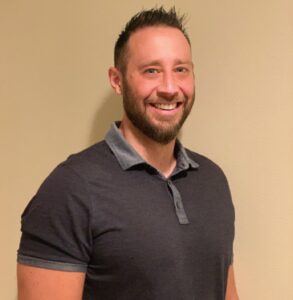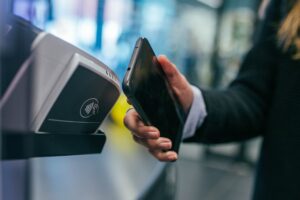 With entrepreneurship in his blood and over eight years of sales experience, Kevin DeMattio embarked on his mission to transform the entry experience. DeMattio’s extensive background and passion for the property technology industry led to eventually establishing “Invictus” to achieve his goal of creating a product that puts the resident first. We caught up with Kevin to learn more about the importance of perseverance in entrepreneurship and how that was incorporated into “Invictus.”
With entrepreneurship in his blood and over eight years of sales experience, Kevin DeMattio embarked on his mission to transform the entry experience. DeMattio’s extensive background and passion for the property technology industry led to eventually establishing “Invictus” to achieve his goal of creating a product that puts the resident first. We caught up with Kevin to learn more about the importance of perseverance in entrepreneurship and how that was incorporated into “Invictus.”
- Could you tell us about yourself and the company?
I am the son of a general contractor, so I’ve been around or doing construction my whole life. I’ve been working since I was able to pick up a 2×4, which at my size was early in life! My parents were hardworking and driven. In our family, we recognize falling is part of life but getting back up, dusting yourself off, and learning from it is required. I moved away when I decided to pursue my education at the University of Colorado, which meant leaving behind everything I knew and embracing the unknown. I was becoming the master of my own fate. During this time, my new family were the communities I chose to live in, the other residents became friends, and the surrounding businesses became family. I set out to create an experience and create partnerships that really solved a lot of the headaches I dealt with for over twenty years in multifamily living. I integrated familiar technology available today to embrace the evolving UX that matches the desires of our next generation of renters. This took four years of development, surveys, focus groups, and testing, some success and some failure. However, it formed us and shaped us into what I believe is the most accurate representation of what makes resident lifestyle the best it can be: Invictus!
- What motivated you to take on the challenge of entrepreneurship?
I think it was innate in me. It’s always been something I’ve dabbled in with friends in several industries. My father and step-father both were owner/operators, so I got to watch and learn a lot from them as well as my brother Jeff. I like the idea of creation with the benefit of someone else at the heart of it.
- What is the driving force of your product?
I really wanted to provide the best experience possible for people like me. I don’t have hundreds of dollars annually to pay for lost or stolen fobs and gate clickers, to buy new bikes because they got stolen, and not save money wherever I can around the local community. I really wanted to bring this all together.
- Tell us about some of the biggest obstacles you’ve had to overcome?
During this venture, I suffered a broken back in January 2017. This, as you can imagine, set up many hurdles. Pretty much everything hit a pause as motor skills were limited and I was in immense pain. I wasn’t even sure I could work again for the first eight months. We lost traction as it scared the team prospective clients. All the large meetings and work on partnerships stopped, development money slowed as investors bailed, which led to more issues in progressing forward. It was a very hard time personally but at the end of day we made it work. I sold stuff, worked everyday on rehab, and once I could start physically operating semi-normal again, I dusted myself off and started the engine again. I was able to start development to continue our work and win over better investors that had an even bigger vision for the future of this product. Now we have an amazing product and strong partnerships.
- What has been the most rewarding, exciting Invictus moment so far?
We really enjoy hearing about happy residents. Ultimately, we will be very happy when we reach the point in our venture that we can turn the wheel on our AllHeartFoundation project. We truly have a heart for domestic philanthropy for children.
- What has surprised you most in this venture?
I won’t say surprised, but I am proud that after all that we went through, we made it and we didn’t give up. We overcame some really big challenges as a startup. The core members of this team stuck with it and were determined to succeed. They stood firm on their commitment to the vision. I’ve heard of some teams that crumble during hard times but not them. Startups aren’t about money in the beginning. They’re about taking risks that few people are built for because it’s a very scary road unless you have a large benefactor behind you. Our journey really showed the true character of our founding members.
- Do you want to be a national brand, or do you hope to go global?
I want to go global. Right now, the entire world is walking around with a smartphone in their hand, which means Invictus can work in any city, state, or country! We don’t have limits for location of installation. Companies like DoorKing and other pioneers set the infrastructure standards; we are simply giving the building a brain. It’s easy to piggyback on the existing wiring. As the world gets older and smaller, we seem to become more unified in our needs and desires. There will always be a need in every corner of the world to feel safer, save money, and to maximize our time through efficient processes.
- What are you striving for over the next six and twelve months?
We want to expand outside of the west coast and achieve some aggressive installation goals with our PMC partners.
- Can you tell us about your mentors and heroes and their impact on you personally/professionally?
My father and mother will always be my heroes and guiding forces. I pray every night that they walk with me in all I’m trying to accomplish. I see any person that truly loves what they do (a successful pursuit itself in life), and searches consistently for ways to improve in it, as a mentor for me. The key to a happy life is loving what you do because you must wake up every day and do it, believe it, and live it. If I can find a consistent source that I believe can make me a better person in different aspects of my life , then I’ll take as many mentors as possible.
- What is one thing that you wish you had known?
I am glad I didn’t know how hard it would be when I was starting this company. You think you can see and you understand all the twists that can come, but I promise there is no way to be prepared fully. If I didn’t have a strong support system with my faith, family, and some quality friends, I don’t know how I could have accomplished this.
- What words of encouragement would you offer to innovators taking the same journey?
Be flexible. Pivot easy. Be resilient. Be brave, be bold, have faith. Celebrate each little milestone, but don’t rest in it. Accept failure but don’t dwell in it. You must learn from it and never quit on your dream!
 Another one of COVID-19’s many effects on the world was changing the work landscape. Those in the workforce now have the option to work fully remote or in a hybrid setting that includes going into the office 2-3 times per week. According to Apartment List, twenty-one percent of workers plan to be fully remote post-pandemic and nineteen percent expect a hybrid environment.
Another one of COVID-19’s many effects on the world was changing the work landscape. Those in the workforce now have the option to work fully remote or in a hybrid setting that includes going into the office 2-3 times per week. According to Apartment List, twenty-one percent of workers plan to be fully remote post-pandemic and nineteen percent expect a hybrid environment. Thanks to the COVID-19 pandemic, more and more apartment property companies are
Thanks to the COVID-19 pandemic, more and more apartment property companies are  According to recent study conducted by RentCafe, there is a rise in higher-income Millennials choosing to rent instead of buying a home. The share of rental applications for renters earning more than $50,000 is at a five year high of thirty-nine percent and rental applicants are making an average of ten percent more this year than last year. With an above average income and higher budget for renting, lifestyle renters can choose to live in amenity-rich, high-quality apartments. However, soaring housing prices as well as inflation and interests due to the COVID-19 pandemic have prevented potential buyers from putting a down payment on a home, thus having to turn to renting instead.
According to recent study conducted by RentCafe, there is a rise in higher-income Millennials choosing to rent instead of buying a home. The share of rental applications for renters earning more than $50,000 is at a five year high of thirty-nine percent and rental applicants are making an average of ten percent more this year than last year. With an above average income and higher budget for renting, lifestyle renters can choose to live in amenity-rich, high-quality apartments. However, soaring housing prices as well as inflation and interests due to the COVID-19 pandemic have prevented potential buyers from putting a down payment on a home, thus having to turn to renting instead. The main purpose of property technology is to simplify the way real estate businesses manage, sell, and rent properties. Although the real estate market has been slow in accepting technological and proptech trends, the proptech industry proved its importance during the COVID-19 pandemic. With less in-person interaction and physical space, proptech tools can help property managers digitize the renting or selling process and make the most of their limited space. The top two benefits of property technology in the workplace include:
The main purpose of property technology is to simplify the way real estate businesses manage, sell, and rent properties. Although the real estate market has been slow in accepting technological and proptech trends, the proptech industry proved its importance during the COVID-19 pandemic. With less in-person interaction and physical space, proptech tools can help property managers digitize the renting or selling process and make the most of their limited space. The top two benefits of property technology in the workplace include: As Millennials continue to put off becoming homeowners and Gen Z begins to enter the workforce, renting becomes more and more popular with these groups. In order to attract young renters, it is important to understand what their ideal rental property looks like. To know what factors to invest into, here are the top seven amenities Millennials and Gen Z renters look for in their future living spaces:
As Millennials continue to put off becoming homeowners and Gen Z begins to enter the workforce, renting becomes more and more popular with these groups. In order to attract young renters, it is important to understand what their ideal rental property looks like. To know what factors to invest into, here are the top seven amenities Millennials and Gen Z renters look for in their future living spaces: Modern apartments now include amenities from communal treehouses to sky terraces with firepits. While this may seem over the top, it shows a shift in what residents and developers look for in high-rise living.
Modern apartments now include amenities from communal treehouses to sky terraces with firepits. While this may seem over the top, it shows a shift in what residents and developers look for in high-rise living.  The COVID-19 pandemic drastically changed our view on contactless technology. Residents are more conscious of what surfaces they touch and the potential spread of germs and bacteria, and more property managers are asking for a solution to ensure the health and safety of their community. The answer?
The COVID-19 pandemic drastically changed our view on contactless technology. Residents are more conscious of what surfaces they touch and the potential spread of germs and bacteria, and more property managers are asking for a solution to ensure the health and safety of their community. The answer?  With entrepreneurship in his blood and over eight years of sales experience, Kevin DeMattio embarked on his mission to transform the entry experience. DeMattio’s extensive background and passion for the property technology industry led to eventually establishing “Invictus” to achieve his goal of creating a product that puts the resident first. We caught up with Kevin to learn more about the importance of perseverance in entrepreneurship and how that was incorporated into “Invictus.”
With entrepreneurship in his blood and over eight years of sales experience, Kevin DeMattio embarked on his mission to transform the entry experience. DeMattio’s extensive background and passion for the property technology industry led to eventually establishing “Invictus” to achieve his goal of creating a product that puts the resident first. We caught up with Kevin to learn more about the importance of perseverance in entrepreneurship and how that was incorporated into “Invictus.”